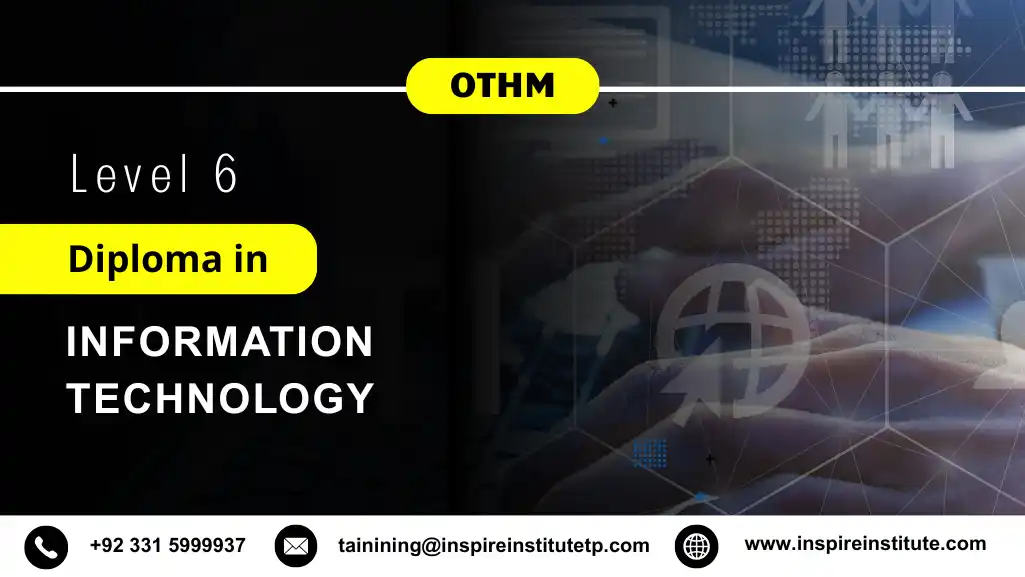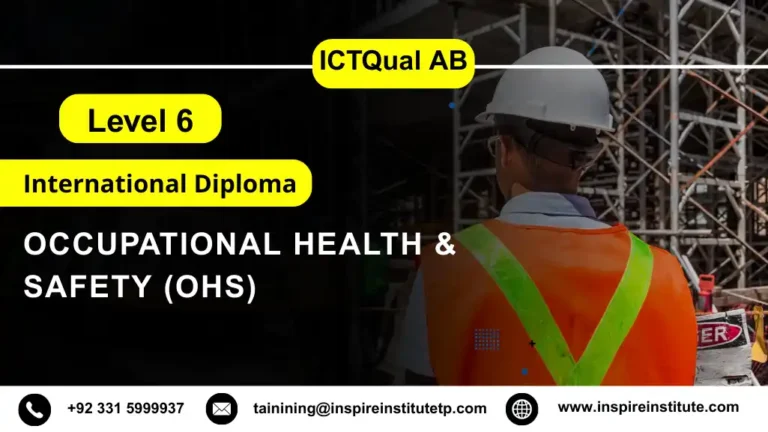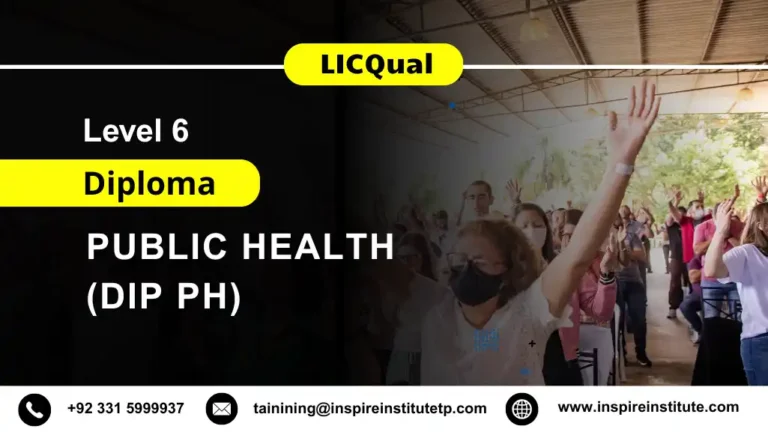OTHM Level 6 Diploma in Information Technology
The OTHM Level 6 Diploma in Information Technology is a comprehensive qualification designed to develop advanced knowledge and practical skills in IT. Aimed at individuals seeking to enhance their expertise or pursue a career in the rapidly evolving tech industry, this course covers key areas such as software development, cybersecurity, data analytics, and project management. It serves as a pathway to higher education or career advancement in various IT roles, equipping learners with the tools to thrive in today’s digital world.
Why Choose this Qualification
The OTHM Level 6 Diploma in Information Technology offers a strong foundation for individuals aiming to advance in the fast-paced world of IT. Here’s why this qualification stands out:
Developed by Experts: The program is developed and reviewed by experienced IT professionals and educators, ensuring high academic and practical standards.
Industry-Relevant Curriculum: The course is designed to reflect current trends and demands in the IT sector, ensuring that learners gain skills that are practical and highly sought after by employers.
Pathway to Further Studies: Successful completion of this diploma provides direct access to Level 7 qualifications and postgraduate programs, paving the way to a full degree or master’s qualification.
Career Advancement: This diploma enhances employability by equipping learners with the technical knowledge and strategic thinking needed for mid to senior-level roles in IT.
Flexible and Globally Recognized: Offered by OTHM, a UK-based awarding body regulated by Ofqual, this qualification is recognized internationally, making it valuable for both local and global job markets.
Course Overview
Awarding Body: OTHM
Course Level: Level 6
Average Completion Time:
6 to 24 Months
Study Units : 6
Evidence & Assignment Based
Qualification Structure
The OTHM Level 6 Diploma in Information Technology comprises six mandatory units, totaling 120 credits, with a Total Qualification Time (TQT) of 1,200 hours and 480 Guided Learning Hours (GLH) required to complete the qualification.
Who Should Take This Course
The OTHM Level 6 Diploma in Information Technology is ideal for:
- Aspiring IT Professionals: Individuals looking to build a career in the technology sector and gain advanced skills in areas like programming, cybersecurity, and data management.
- Current IT Practitioners: Professionals already working in IT roles who want to upgrade their qualifications, expand their knowledge, and move into higher-level positions.
- Graduates of Related Fields: Learners who have completed a Level 5 diploma or equivalent in computing, information systems, or a related discipline and wish to continue their studies.
- Career Changers: Individuals from other sectors seeking to transition into the IT industry with a recognized and comprehensive qualification.
- Entrepreneurs & Tech Enthusiasts: Those looking to start their own IT-related businesses or enhance their digital skills to support existing ventures.
OTHM Level 6 Diploma in Information Technology is designed to accommodate both full-time learners and working professionals, making it a flexible option for a wide range of individuals passionate about technology.
Course Benefits
The OTHM Level 6 Diploma in Information Technology offers a wide range of benefits for learners aiming to succeed in the dynamic IT industry:
Enhanced Career Prospects
Gain the skills and knowledge required for a variety of roles in IT, including systems analyst, software developer, network engineer, and IT project manager.
Pathway to Higher Education
Successfully completing this qualification allows progression to Level 7 diplomas or master’s degree programs in IT and related fields.
Practical, Job-Ready Skills
The course emphasizes real-world applications of IT principles, preparing learners to tackle industry challenges confidently.
Globally Recognized Qualification
Awarded by OTHM and regulated by Ofqual (UK), this diploma is internationally respected and valued by employers worldwide.
Flexibility and Accessibility
The course structure supports both full-time and part-time study options, making it suitable for working professionals and students alike.
Developed by Industry Experts
The curriculum is designed and reviewed by experienced professionals, ensuring that it stays relevant and aligned with current technology trends.
Boosted Confidence and Competence
Learners graduate with a strong foundation in IT, leadership, and analytical thinking—skills essential for success in a technology-driven world.
Eligibility Criteria
Eligibility Criteria for the OTHM Level 6 Diploma in Information Technology:
To enroll in the OTHM Level 6 Diploma in Information Technology, learners must meet the following criteria:
Academic Qualifications: A relevant Level 5 qualification or equivalent, such as a diploma in IT, computing, or a related field.
Age Requirement: Learners must be at least 18 years old at the start of the course.
English Language Proficiency: For non-native English speakers, a good command of English is required. Applicants may need to provide evidence of English proficiency, such as an IELTS score of 5.5 or equivalent.
The Qualification Process
Here is a step-by-step guide to help you understand the entire journey from pre-registration to certification:
1. Initial Assessment and Enrollment
- Application and Eligibility Check: To begin the process, you will need to complete an application form. The training provider will review your eligibility based on your work experience, current role, and relevant qualifications.
- Enrollment: Once your eligibility is confirmed, you will be enrolled in the program. You will receive information on the course structure, key requirements, and resources available to support your learning.
2. Course Structure and Content
- Unit-Based Learning: The qualification is made up of several units that focus on core topics in quality control, quality assurance, regulatory compliance, risk management, and continuous improvement. You will be required to complete all units and demonstrate your proficiency in these areas.
- Work-Based Learning: As a work-based qualification, the OTHM Level 6 Diploma emphasizes the application of learning in real-world scenarios. You will need to collect evidence of your competence by demonstrating how you have implemented quality systems and processes in your workplace.
3. Ongoing Support and Assessment
- Dedicated Assessor: Throughout the course, you will be assigned a qualified assessor who will guide you through the process. The assessor will provide ongoing support, review your progress, and offer feedback on your work.
- Assessments: You will be assessed via a combination of methods, including:
- Portfolio of Evidence: Collecting evidence from your workplace to show how you apply quality management techniques, compliance measures, and process improvements.
- Reflective Accounts: Writing reflective reports that describe your learning journey and how you’ve applied new skills in your role.
- Professional Discussions: Engaging in discussions with your assessor to demonstrate your understanding of key concepts and practices in quality control and assurance.
- Workplace Observation: In some cases, your assessor may conduct a direct observation of your work to ensure you meet the required standards.
4. Completion of All Required Units
- To achieve the OTHM Level 6 Diploma, you must successfully complete all required units in the qualification. Each unit is designed to test your ability to manage and improve quality assurance and control systems within your workplace.
5. Final Review and Verification
- After completing all units and submitting your portfolio of evidence, your assessor will review your work to ensure it meets the required standards. This may involve revising some areas of your portfolio based on feedback.
- Quality Verification: Your assessor’s evaluation will be verified by an internal quality assurer to ensure consistency and fairness in the assessment process.
6. Awarding of the Qualification
- Once you have successfully completed all units and met the assessment criteria, the qualification will be awarded. You will receive Certification of the OTHM Level 6 Diploma in Information Technology
7. Post-Qualification Support
After earning the diploma, you will be better equipped to take on senior roles in quality management. Many learners also benefit from continued support from the training provider, including access to professional development opportunities, industry networking events, and further qualifications.







